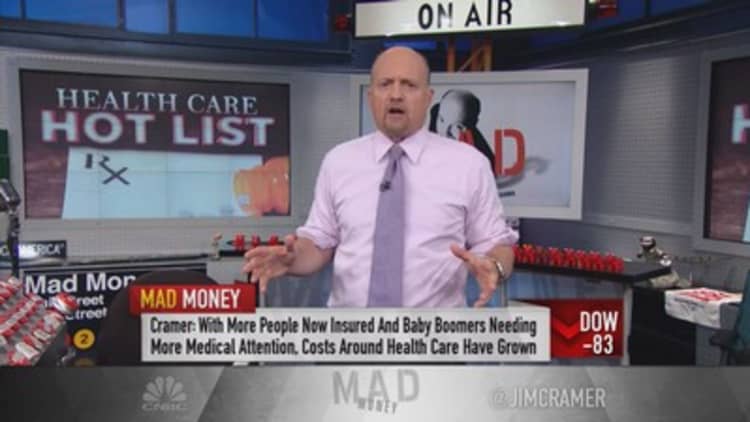
As Jim Cramer has said many times recently, we are in a no-win environment when it comes to economic growth. Either the economy will continue to slow, or the Fed will raise interest rates and slam the brakes on commerce in this country in order to make the superfreakin' dollar stronger than it already is.
Bad news!
Unfortunately, one of these two scenarios is very likely to become reality, but that does not mean all stocks need to take a nose dive as a result. A low-growth environment can be good news for companies with consistent growth, as investors will soon flock to them.
"I think we are going to see huge piles of money pour into these consistent, secular growth cohorts that tend to dramatically outperform the rest of the market during a slowdown," the "Mad Money" host said. (Tweet This)
With this in mind, Cramer's favorite secular growth theme right now is the health-care cost-containment plays. Health care is one group that remains consistent, as people still will not cut back even when they feel less wealthy. The cost containment plays are some of the fastest growers because health-care costs have become such a huge problem in America.
This week, Cramer will focus on his three favorite wholesale drug distribution companies, which play a huge role in containing health-care costs. Cardinal Health is a very acquisitive company that acts as both a wholesale supplier of drugs and medical supplies, including everything from surgical apparel to gloves to fluid-management products.
It is also the top distributor of direct-to-home medical supplies and operates the world's largest network of nuclear pharmacies. It provides resources to more than 75 percent of all U.S. hospitals, along with 20,000 U.S. pharmacies and 1.5 million patients.
The company was originally founded in the early '70s as a food distributor, but over time it transitioned into a drug distribution business that grew so fast that in 1988 they sold off the food business to focus entirely on health care. It then it went on an acquisition spree in the 1990s in order to expand reach and grow into its market share.
In March the company also announced it would acquire Cordis, the medical supply business owned by Johnson & Johnson, for $2 billion in cash. Then last Friday investors learned that Cardinal bought The Harvard Drug Group for $1.15 billion in cash. This will expand its reach even further for generic drugs, and give them specialized packing capabilities.
All of this activity shows that Cardinal has established itself as a serious consolidator when it comes to drug distribution and medical supply space, and Cramer thinks these two deals will spur growth for years down the road.
----------------------------------------------------------
Read more from Mad Money with Jim Cramer
Cramer Remix: When to buy Rite Aid
Cramer: Serial acquirers sparking $$$
Cramer's game plan: Next week all depends on this
----------------------------------------------------------
"If the company can keep making these small but meaningful acquisitions over time, then I could see the stock ultimately trading much higher. Plus, I think Cardinal could potentially be an attractive takeover candidate for its larger and better capitalized competitor McKesson," Cramer added.
These two acquisitions have put Cardinal in the sweet spot as a buy, in Cramer's opinion. It is the cheapest name in the group, trading at only 17.9 next year's earnings estimates. So while others are fretting what the Fed will do, Cramer thinks it could be time to pounce on Cardinal while it is still a steal.
Questions for Cramer?
Call Cramer: 1-800-743-CNBC
Want to take a deep dive into Cramer's world? Hit him up!
Mad Money Twitter - Jim Cramer Twitter - Facebook - Instagram - Vine
Questions, comments, suggestions for the "Mad Money" website? madcap@cnbc.com



